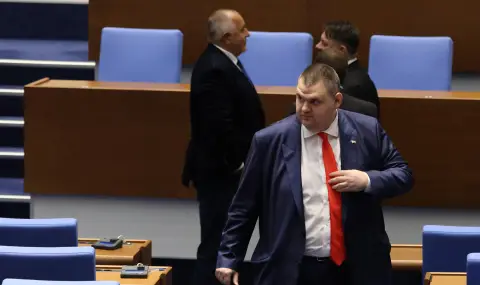Veselin Stoynev's comment:
The nearly month of parliamentary life lost has drawn a somewhat clearer picture:
First, the winner GERB is in complete isolation and unable to move away from Delyan Peevski - proven by 15 votes in the first and second ballots for the candidate for chairman Raya Nazaryan, who did not receive a single vote outside her own party.
Second, an alternative majority of PP-DB, "Vazrazhdane", ITN and BSP did not materialize due to disagreements in PP-DB. DB voted in three different ways for Silvi Kirilov, and two of the PP MPs became almost dissidents. At the same time, there is an almost obvious dependence of a large part of the BSP group on Peevski, who did not sign the cordon sanitaire against "DPS-New Beginning".
Thirdly, the parties cannot help but think of the Speaker of Parliament as an acting prime minister because of the emptied "house book" - at least until the Constitutional Court decides whether to return the power of the president to determine the acting government himself.
The election of the Speaker - a key with one or two turns
The cycle in a circle has returned us to the starting position: governing majorities are impossible - behind GERB because of Peevski and behind PP-DB because of "Vazrazhdane". And the Speaker of Parliament turns out to be the key, which is uncertain whether it will turn only once - as part of a governing majority, or twice - as a door to new elections.
With his response to the candidacy of DSB leader Atanas Atanasov for Speaker of the National Assembly, Boyko Borisov is playing a double game - he is both backing down and looking for a governing majority that he can personally lead, once again putting forward his candidacy for Prime Minister. This is completely unacceptable for PP-DB, which had set as a precondition for collaboration with GERB, along with the cordon sanitaire around Peevski, that the GERB leader not be Prime Minister. Borisov's offer, however, is more aimed at driving a wedge into PP-DB, which has already split along the "Vazrazhdane" axis with the candidacy for parliamentary speaker of Silvi Kirilov from ITN. And the PP was not slow to immediately announce that they would vote for Atanasov, but would not negotiate with Borisov because he had not signed the declaration on the cordon. The DB, on the other hand, are unable to interact on their own without the PP, because they would be accused of being "gerberas".
Peevski's march towards elections
The pressure on the second formation is increasing after the refusal of "DPS-New Beginning" to nominate its candidates for any leadership positions in parliament, thereby largely invalidating the sanitary cordon. Peevski once again demonstrates that his goal is to quickly go to elections.
The question is whether Borisov can start real negotiations for governance, withdrawing his candidacy for prime minister and the intention to return the first mandate and signing some revised version of the declaration on the sanitary cordon. And will he be able to attract both ITN and BSP according to the original idea of a four-way coalition? Or is his goal in sync with Peevski to go to elections, placing the blame entirely on PP-DB for the failure of the 51st parliament, after he seemingly made so many concessions?
The second does not seem unattainable given the PP-DB's apparent fear of a re-assembly, from which they suffer heavy damage. If Borisov's strategy is to deepen the split in PP-DB and push them towards an alternative majority with "Vazrazhdane", this will definitely happen when the parliamentary roulette wheel is turned. The second political force will remain formally united, at least so as not to fall out of the position of second and lose the second mandate to form a cabinet. And if he tries to implement it, or even participate in a third possible ITN, there is no way he can escape his promise that he cannot participate in a governing majority that depends on "Vazrazhdane". And this could already lead to a formal split in the coalition.
The threat of not becoming like in Romania
A geopolitical threat once again appears as an opportunity in the form of an accident to play the role of glue - just as the war in Ukraine was the driving force for Assembly-1, so the turmoil in Romania may prove to be the glue for Assembly-2. If Romania is eventually removed from the orbit of the most loyal friend of the United States on the continent - the country that is building the largest NATO base in Europe near Constanta, which borders Ukraine, but may veer towards the pro-Putin camp, then the threat from President Radev increases again, as in the first assembly. The point is that the Bulgarian political process is moving too slowly and the Romanians can overcome their political crisis this Sunday in the presidential runoff, before the Bulgarians try to use them to resolve their crisis. One can hardly expect effective overseas pressure for a second assembly in our country in the timelessness until Trump's inauguration, since there was no successful one to preserve the first one.
There is still a lot of political time until the final outcome, the question is at least that it does not drag on too long and chronologically.
